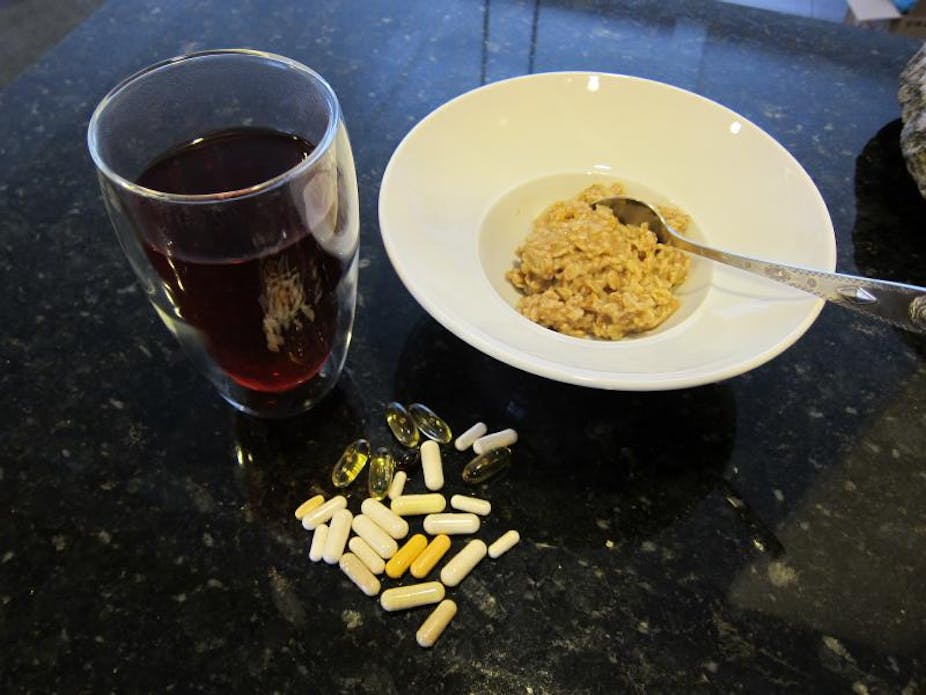A study published yesterday in the Archives of Internal Medicine has investigated the link between taking dietary supplements and an increase risk of death in older women.
Associate professor Ian Chapman from The University of Adelaide explains the methodology and findings of the study.
This paper looks at the Iowa Women’s Health Study, which started in 1986, and examines mortality or death rates through to 2008.
The average follow-up period was 19 years for each person. The subjects were older, post-menopausal women with an average age of 61 at the start of the study.
I don’t know if this is a great paper because there are so many variables that the authors have corrected for: there were clear differences between the women who took the supplements and those who didn’t at baseline.
The women who took the supplements were more likely to be non-smokers; they were twice as likely to be taking hormone replacement therapy (HRT); they had higher education levels and lower body-mass index; and they were more physically active.
What’s more, they were different on every single measure of dietary intake that was reported in the paper.
The authors have tried to correct for these differences with their analyses and found certain effects of the supplements.
But I can’t find the absolute death rate in the paper in either of the two groups before the authors start their corrections. And you’ve got to be wary when people make corrections for a variety of variables.
These are statistical corrections and there are ways to do them but they don’t allow for underlying factors.
Women who are unwell, for instance, might start taking multi-vitamins or minerals. And they could die because they were unwell, not because of the multi-vitamins or minerals.
That kind of factor isn’t picked up in these multi-varied analyses.
The link with iron supplements and mortality is the strongest. Why would older women be taking iron supplements?
I’m presuming the women were taking iron supplements because they’d been found to be iron deficient, which may relate to bleeding. That’s the most common cause of iron deficiency and anemia.
In a post-menopausal woman, this is likely due to gastrointestinal bleeding or it could be post-menopausal uterine bleed of some sort. Now, neither of those are good and both could reflect an adverse outcome anyway.
In fact, the supplements might be treating the thing that’s causing these women to have an increased death rate.
Alternatively, iron may be given non-specifically for anemia without the women necessarily being iron-deficient.
High body iron stores have been linked to increased rates of cardiovascular events in some studies. The link between increased mortality and iron supplementation does appear to be quite strong in the analyses. Iron seems to be associated with increased death rate, while calcium is linked to a reduced death rate.
They are two of the strongest findings of the paper.
What have other studies concluded about taking supplements?
There have been a number of such studies – population-based, prospective cross-sectional studies rather than randomised-controlled trials.
Most of them don’t show any great benefit for either mortality or well-being from taking minerals or multi-vitamins in the absence of a clear-cut deficiency syndrome.
There’s been some recent suggestion from meta-analyses that maybe vitamin D supplements for older people may help them live a little longer but there really isn’t much evidence.
And, in some circumstances, there’s even evidence of harm. On balance, there’s possibly more evidence of harm than good, especially if some supplements are taken in high quantities.
In particular, some antioxidants, such as vitamin E and A, can cause some harm if taken in excess.
Why is it so difficult to get a clear picture about vitamin and mineral supplements?
The difficulty with all these studies is that they are not proper controlled, randomised trials.
That’s because the latter are really hard to do: various people in the control group will go off and take multi-vitamins and minerals on the side – how do you control for that?
And you have to do a study for a number of years. This study had an average follow up of 19 years in almost 40,000 women. Ideally we should take a group of people and randomise them into groups that have minerals and vitamins or not and then follow them to see what happens.
It would be hugely difficult to do such a large study for that long in a randomised and controlled way.
So we have studies like this which use varied data that have to be adjusted for, and the authors end up saying, when we’ve made all these adjustments, we end up with this result.
What should we take away from this study?
The evidence from the study is that you don’t live longer by taking multi-vitamins and minerals, with the possible exception of calcium.
Whether there is any harm, I think is another matter and I wouldn’t rely too strongly on this paper for evidence about that.
Both the paper and the associated editorial about this study don’t support the use of supplements in healthy people who don’t have a known deficiency and aren’t on a medication or have a disease likely to cause it. And I wouldn’t recommend them either.

